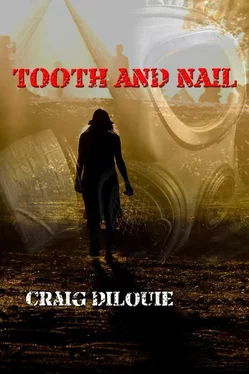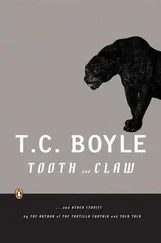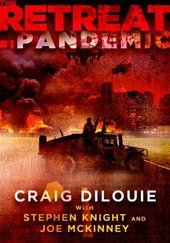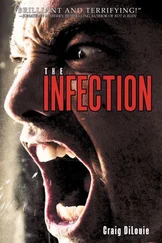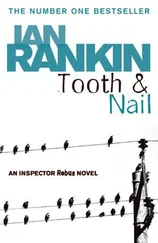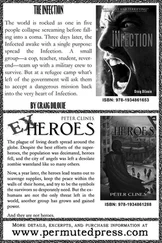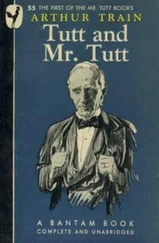“No,” Bowman says. His eyes follow a pair of helicopters moving over the East River until they disappear behind a tall building. He takes it as a good sign that there are still birds in the air. “Captain West had the right idea trying to concentrate the Company. Warlord is spread out all over Manhattan and is vulnerable to being destroyed piecemeal. But it’s too late. We got chewed up. We should have consolidated sooner.”
“Maybe you’re right,” Knight says. “We shouldn’t have been spread out in the first place, then. It’s a mystery. I have a hard time believing that either the government or the Army didn’t know about the infection rate among the Mad Dogs.”
“Could be they were trying to avoid pushing an already panicked country into outright hysteria,” Bowman says. “Could be that they honestly didn’t know. Who knows? Right now, my situational awareness extends to what I can see with my own eyes.”
“Well, if somebody higher up knew about this and didn’t tell us, they may have just destroyed our brigade.”
Bowman stares at him intensely and says, “Hell, Steve. Forget Quarantine. If somebody higher up knew and didn’t tell us, they may have destroyed the U.S. Army.”
Gaps in the chain of command
Sherman tries again to raise Warlord, the call sign for Battalion, and Quarantine, which is Brigade’s call sign, without success.
“Warlord, Warlord, this is War Dogs, do you copy, over?”
No answer from Battalion. The Battalion net is being overloaded with chaotic messages blending together into one long screech. From what the RTO can tell, War Hammer is screaming for reinforcements and ammunition, Warmonger reports the successful occupation of the old Seventh Regiment Armory Building, and War Pig says it has three men down and where’s their goddamn medevac.
“Warlord, Warlord,” Sherman says, then stops. It’s useless.
Sherman switches to the Brigade net and tries to hail Quarantine.
Nobody answers. The only officer he can get a hold of, as they say in the ranks, is General Confusion. The voices on the Brigade net are less panicked than Charlie’s sister companies, but equally confused. There are units missing, trying to consolidate, requesting orders, demanding resupply, on the move, taking casualties. There are gaps in the chain of command. Units are disappearing or moving without their commanders knowing it.
When Quarantine’s XO finally makes an appearance on the net, it is apparently without his knowledge or consent, as he’s shouting at somebody else in the room about a story that The New York Times is writing about the Army’s sudden decision to lay waste to New York and almost every other major city in the country.
Somebody else, Sherman does not recognize the voice, says there is not going to be a New York Times tomorrow morning, and then the transmission cut out.
The civilian nets are even more ominous.
National Guard units defending City Hall have abandoned their positions and moved north, and protestors have occupied the building and are busy turning it into a fortress. The commander of the Guard unit was found dead at his post. The Mayor is missing. Right now, there is nobody running the government of New York City.
Meanwhile, operators are still calling first responder units, but units are not reporting back. The nets are going silent one by one, populated only by panicked operators asking over and over if anybody can hear them.
A cop gets on the net, says he has eyes on a group of vigilantes lynching five Lyssa victims from streetlight poles, and requests backup, but there is no help to give. Frustrated, the cop breaks protocol by asking the operator if there is a fucking plan.
Sherman senses that the government and the military are holding something back from the people who live here, but the people already know about it, and have begun to take matters into their own hands.
It is interesting, but ultimately not his concern.
He switches to Charlie Company’s net and resumes his search for Fourth Platoon, which had been on Third Platoon’s heels during the march to the school but suddenly disappeared and is now considered lost.
All of this makes for discouraging work for a radio/telephone operator, but a good RTO must have the patience of a saint, and Sherman is good at his job. He is not complaining. Even though he is not getting through to anybody, the traffic is more entertaining than he has ever heard it.
Things are bad, but like all crises, this too shall pass, he believes. He tells himself the government and the Army will fix it when those in charge finally get their heads out of their collective asses and do what needs doing. The United States survived the First and Second World Wars, Cold War, Spanish Flu Pandemic, Presidents Nixon through Obama, the Great Depression and the September Eleventh attacks. It can survive this lousy Lyssa Pandemic. Someday, he will tell his kids about how scary and exciting it all was, and he and his comrades will be called the Greatest Generation by their grandchildren.
He likes working alone so that he can take off his mask and smoke without any hassles. Lighting one up, he realizes that he is down to four packs now and after that, with all the supply problems he has been hearing about, there might not be any more cigarettes for a while. The thought fills him with panic. A lot of the boys smoke for fun, but he is an addict. He tries to put this unsettling train of thought out of his mind by throwing himself back into his work.
When he switches back to Brigade traffic, a strong, gravelly voice cuts through the babble:
This is Quarantine actual. Clear the net. Break.
The voice is calm, almost dry, but the effect is electrifying. Within moments, the chatter is reduced by more than half.
I say again: This is Quarantine actual. Clear the net. Break.
Sherman takes out his notepad and pencil, excited. He has only rarely heard Colonel Winters, the commander of the Brigade, get on the net in person.
All elements of Quarantine, this is Quarantine actual. Message follows, break.
You don’t see that every day
McLeod paces just inside the doors to the school. About ten meters down the hallway, Martin and Boomer pass a cigarette back and forth, leaning on the sandbags of their MG emplacement. McLeod strolls over, cradling his SAW.
“ Salaam ’Alaykum , boys,” he says.
The gunners nod. McLeod watches in amusement as they turn away and pull down their masks to take a drag.
He adds: “You guys do realize that if one of you has Lyssa, the other now has it.”
“Go to hell, McLeod,” Boomer says.
“What do you mean?” Martin says.
“You’re sharing a smoke,” McLeod explains. Seeing their blank expressions, he shakes his head. “Never mind.”
“This is not a good time to go around scaring people,” Boomer warns him.
“What a crappy post,” McLeod says darkly. “A freaking school. Look at this poster some kid made with a bunch of crummy markers: ‘Welcome back’ in a hundred languages. Christ, I’d rather be in goddamn Baghdad getting shot at.”
“I’ll bet you were one of the most popular guys in high school,” Martin deadpans, making the AG snort with laughter. “Because you’re such a comedian.”
“Sleep deprivation makes me hilarious.” McLeod yells at the ceiling, “I need sleep!”
“Why aren’t you bunking with your squad, McLeod?” Martin says, winking at Boomer, who grins back.
“Magilla’s got it in for me. Everybody else gets to sleep a few hours, while I’m stuck doing guard duty with—no offense—you guys.”
Boomer bursts into laughter while Martin says, “You’re lucky that’s all you got.”
Читать дальше
